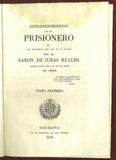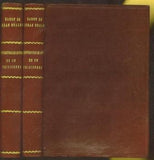Entretenimientos de un prisionero en las provincias del Rio de la Plata
Author: Moxo y de Lopez, Luis Maria de (1775-1843)
Year: 1828
Publisher: En la Imprenta de Jose Torner
Place: Barcelona
Description:
Two volumes: [8]+viii+334 pages with engraved dedication in script, engraved supplemental pictorial title page and two plates; [6]+391+16 pages with engraved supplemental pictorial title page, appendix and one engraved plate. Octavo (8" x 6") bound in brown leather with gilt lettering to spine. Plates by J. Amillo. (Sabin 51215, Palau 183810) First edition.
An important work on the Indians of Mexico, especially the Tarascans of Michoacan, written in Mexico by MarÃa de Moxó y Francolà (1763-1816) and printed here by his nephew Juras Reales. "A valuable set of dissertations upon the natives and history of the New World, written by Don Benito Maria de Moxo, Archbishop of Charcas, whose papers fell into the hands of his nephew [Luis Maria de Moxo y de Lopez], and were printed by the latter under his own name without sufficient acknowledgement" - Sabin. The work contains fourteen essays by Benito Maria Moxo y Francoli written in 1805 in Michoacan where he served as auxiliary bishop from 1803 to 1805. The varied topics include Indian music; human sacrifice; Tarascan pre-Columbian painting; geometry; arithmetic and hieroglyphic writing; Black slavery in the Spanish colonies; and two essays on natural history. The appendix prints Moxo's 1807 speech in response to the British invasion of Buenos Aires. The fine engraved plates by J. Amillo include a scene of missionaries playing music for the Indians; a detailed representation of "Idolo Huitzilopochtli" (lively dancing Huitzilopochtli with mask, wearing feather headdress and holding a shield); and a stone idol on a broken base. A later edition appeared under the title Cartas Mejicanas in 1837
MarÃa de Moxó y FrancolÃ, a controversial writer of the Spanish-American Enlightenment, was accused of collaborating with both monarchists and revolutionaries. His work is also marked by ambiguity, due to his loyalty to Spain and his sympathy for the original inhabitants of Mesoamerica, resulting in a complicated example of literary colonialism. This work explores Mesoamerican archaeology, astronomy, pictorial codices, human sacrifice, mathematics, comparative study of suicide among Native Americans and Europeans, pre-Columbian music, and other unusual anthropological subjects, such as the Tarascan painted manuscript discussed by Glass. Dismissed are the claims by Robertson and De Pauw that Amerindian culture is inferior, though the author rebukes Voltaire for minimizing the extent of human sacrifice and cannibalism among the Aztecs. He resolutely defends the Spanish conquest. Perhaps the most important result of the work was its contribution to an upsurge in interest in Mesoamerican archaeology and art. The copperplate engravings are handsome and well executed.
Condition:
Modern rebinding with new end papers. A very good set.
Year: 1828
Publisher: En la Imprenta de Jose Torner
Place: Barcelona
Description:
Two volumes: [8]+viii+334 pages with engraved dedication in script, engraved supplemental pictorial title page and two plates; [6]+391+16 pages with engraved supplemental pictorial title page, appendix and one engraved plate. Octavo (8" x 6") bound in brown leather with gilt lettering to spine. Plates by J. Amillo. (Sabin 51215, Palau 183810) First edition.
An important work on the Indians of Mexico, especially the Tarascans of Michoacan, written in Mexico by MarÃa de Moxó y Francolà (1763-1816) and printed here by his nephew Juras Reales. "A valuable set of dissertations upon the natives and history of the New World, written by Don Benito Maria de Moxo, Archbishop of Charcas, whose papers fell into the hands of his nephew [Luis Maria de Moxo y de Lopez], and were printed by the latter under his own name without sufficient acknowledgement" - Sabin. The work contains fourteen essays by Benito Maria Moxo y Francoli written in 1805 in Michoacan where he served as auxiliary bishop from 1803 to 1805. The varied topics include Indian music; human sacrifice; Tarascan pre-Columbian painting; geometry; arithmetic and hieroglyphic writing; Black slavery in the Spanish colonies; and two essays on natural history. The appendix prints Moxo's 1807 speech in response to the British invasion of Buenos Aires. The fine engraved plates by J. Amillo include a scene of missionaries playing music for the Indians; a detailed representation of "Idolo Huitzilopochtli" (lively dancing Huitzilopochtli with mask, wearing feather headdress and holding a shield); and a stone idol on a broken base. A later edition appeared under the title Cartas Mejicanas in 1837
MarÃa de Moxó y FrancolÃ, a controversial writer of the Spanish-American Enlightenment, was accused of collaborating with both monarchists and revolutionaries. His work is also marked by ambiguity, due to his loyalty to Spain and his sympathy for the original inhabitants of Mesoamerica, resulting in a complicated example of literary colonialism. This work explores Mesoamerican archaeology, astronomy, pictorial codices, human sacrifice, mathematics, comparative study of suicide among Native Americans and Europeans, pre-Columbian music, and other unusual anthropological subjects, such as the Tarascan painted manuscript discussed by Glass. Dismissed are the claims by Robertson and De Pauw that Amerindian culture is inferior, though the author rebukes Voltaire for minimizing the extent of human sacrifice and cannibalism among the Aztecs. He resolutely defends the Spanish conquest. Perhaps the most important result of the work was its contribution to an upsurge in interest in Mesoamerican archaeology and art. The copperplate engravings are handsome and well executed.
Condition:
Modern rebinding with new end papers. A very good set.











